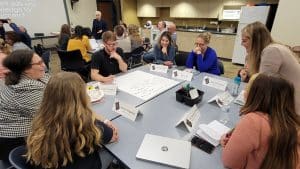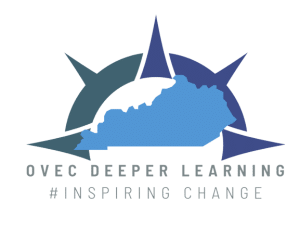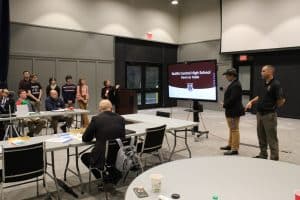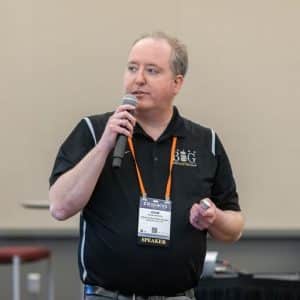Diving into a Deep Blue(grass) Sea of Innovation, Part Two: Early Lessons Learned When Implementing Multi-District Deeper Learning in Kentucky
CompetencyWorks Blog
In Part One, I discussed how I joined a Kentucky educational cooperative’s newly launched Deeper Learning Team in the summer of 2022 – one of eight such Teams created throughout the state. Deeper Learning Teams help make what stakeholders across the state want for education a reality, which is represented by the “Three Big Ideas” of the United We Learn Kentucky fall 2021 report: more vibrant learning experiences, innovation in general but especially in assessment, and better community collaboration. In Part Two below, I reflect on the journey so far at the midpoint of the Team’s first year of deployment.
As we now enter the second half of the current school year, it is an appropriate time for reflection. What have been the challenges of implementing deeper learning, and what are encouraging signs of early success? While I can speak only from my personal experience as part of Ohio Valley Educational Cooperative (OVEC)’s Deeper Learning Team, I can offer my observations on some of the challenges of implementing deeper learning, alongside some recommended approaches to meet them. These are based on our team’s philosophy of systems change as well as actual supports we have provided.
It’s hard work…but it’s the right thing to do.
Change can be difficult, but we have to realize that the traditional system no longer serves all students well. In truth, it never has. Five years after high school graduation, what happens to our so-called “college-ready” students who have dropped out with nothing to show for their efforts but debt? More fundamentally, how has the memorization of facts and ACT test-taking strategies helped high school graduates achieve success in the modern workplace, regardless of their path to a career? Students need more authentic, deeper learning experiences and more opportunities to apply durable skills (often articulated in a district’s Profile of a Graduate). When you can Google basic facts and industries are rapidly automating their labor, schools need to cultivate students who are critical thinkers, collaborators, and communicators.

Teachers don’t need “one more thing” on their plate…so change the perspective and the platter.
Deeper learning cannot be seen as an additional initiative, jockeying for room in an already crowded learning space. There are multiple ways we can address this:
- It’s less about novelty and more about naming and intentionality. There are many pedagogical and strategic paths to Deeper Learning, many of which are already being explored in some fashion by instructional staff. Project-based learning, inquiry-based learning, creative internships, periodic student-led exhibitions, student-to-student discourse, STEM cross-content community designs, Profiles of a Graduate, transitional grade-level Defenses of Learning, competency-based learning…all of these, and more, have their place in the deeper learning journey, so “deeper learning” does not have to be seen as something “new.” Our team often articulates best practices in how to start or improve these various approaches, and how they may best be done with intentionality as part of planning a more effective classroom/school/district system of learning.
- Transform instead of adding. Speaking of systems, we do not need to think of “deeper learning” as an additional thing to learn and implement in classroom instruction, which makes it feel burdensome. Let’s not add to the plate and make it one more aspect to juggle, but see it as a change to the plate itself. Think of deeper learning as a “swap out” for a traditional system over time instead of an ungainly add-on.

- Celebrate the pockets. We believe that deeper learning is already happening in the margins of schools: in programs with limited membership (gifted and talented enrichment pullouts, CTE pathways, afterschool robotics clubs, etc.), in outlier classrooms with vanguard teachers, and seeded in smaller pieces in the occasional lesson. Instead of imposing a “new way of doing things” from the top down, share how “you’re already doing it!” from the ground up; we believe this grass-roots approach can build better morale and motivation. Therefore, an outside entity like a Kentucky regional co-op that travels and talks both inside districts as well as between them can be particularly suited to publicize such pockets, by seeking them out to highlight and holding up these examples as models for others to emulate. This in turn can lead to better scaling and spreading of deeper learning, as well as more equitable educational experiences.
- Find and increase joy. Happiness for teachers can be measured in multiple ways. I’m all about jeans days, free donuts in the lounge, and higher pay, but if teachers are going to last twenty or thirty years in the profession, they also need to feel more efficacious – that what they do truly makes a difference and matters. Deeper learning is all about finding ways to make learning more “sticky” and engaging, increasing student agency, and discovering the “play” that can be integrated into authentic learning experiences.
Professional development is difficult in a near-subless system…so give virtual and asynchronous options, as well as “portable pedagogy.”
The logistical hands of our post-pandemic/endemic world are tied in ways that are unlike any we’ve seen before. The ability to find substitutes for teachers who call in on any given day is difficult enough, much less the amount of subs necessary if you pulled out large numbers of staff. On the other side of the issue, vacant teaching positions are currently difficult to permanently fill, veteran teachers are retiring in record numbers, and many new teachers have emergency certifications with little classroom experience. With a high need for PD, but encumbered with a strangled sub pipeline, how do you succeed against such odds?
- While offering in-person options are still valuable (nothing can top the gift of time for educators, so they can focus on learning while also providing real-space camaraderie), we recognize that virtual teleconferencing options during after school hours are also necessary, which can be recorded for later viewing to enable PD that is “anytime/anywhere.”
- Organizing useful online deeper learning resources is important (and here is our modest attempt).
- We know that much of our in-person PD participants are those with a bit more flexibility to leave their buildings, such as administrators and instructional coaches. Their feedback to us from earlier PD sessions made it clear that they appreciate (to repurpose a phrase used by others) “portable pedagogy”: practical strategies and tips that can be easily brought back and shared with teachers. While we appreciate and talk about long-range planning, it’s hard to beat a strategy you can use next Tuesday.
For that “portability” purpose, we have used a process that so far has elicited praise from our participants. First, we have led educators through various activities that show classroom lessons and school structures through the continuum of three phrases: Traditional, Transitional, and Transformational. (While I originally articulated this specifically as a way of looking at edtech, it has also worked very well for our team to guide the movement toward general deeper learning practices.) While what we see in many educational books and much of classic professional development concentrates on the models of what is considered Transformational teaching, we acknowledge that such a lofty goal can often feel discouraging and out of reach. So many steps! So many months of practice! So much learning!
Instead, our Deeper Learning Team often concentrates on the Transitional – the one or two “moves” away from old school teaching that with a little scaffolding can happen tomorrow or next week. We call these moves our “Simple Shifts.” As we immerse, model, and/or uncover these Simple Shifts in our sessions of professional development, we increase their reproducibility by sharing our list of Shifts on a Google Sheet; each Shift is linked to a specific Slide (from our growing Google Slide deck) with examples and further resources. With time – and a cumulative application of such Simple Shifts – teachers can eventually arrive at Transformational learning, but in a way that feels gradual and possible.

Encouraging Examples of Deeper Learning in the Field
Despite these and other challenges of implementation, we are encouraged to see examples of deeper learning already taking hold in our OVEC region. The most effective of these have district-level change (as evidenced in creating and integrating a Profile of a Graduate, a “north star” for learning aspirations) alongside examples of classroom-level transformative practice.
- In Bullitt County Public Schools, the BCPS Graduate Profile not only lives side by side with their Core Values and Board of Education Accountability, but is exhibited in vibrant project-based learning throughout their schools; to take just one example, a “Farm to Table” community project at Bullitt Central High School culminated in an event that involved multiple departments, including Agriculture, Culinary, Art, Finance, and others.
- In Trimble County Public Schools, leaders took a hard look at their original graduate profile (“The Raider Way”) from a few years ago, and decided it was best to give it a reboot. “The Raider Way 2.0” has led to building Performance Outcomes for grade bands K-2, 3-6, 7-9, and 10-12, making their graduate profile go beyond just being a poster on a wall to something measurable in student work.
- Susan Patrick and Charles Reigeluth recently spotlighted the efforts of Eminence Independent Schools and Shelby County Public Schools in their November 28, 2022 Education Domain blog entry. The “Eminence Exemplars” for grades K-12 exemplifies their focus on personalized learning (which includes student and staff micro-credentialing) and likely explains why their high school students have had such success in dual enrollment at a local university. Shelby’s nationally recognized steps of transformation to a competency-based education system is made possible because their Profile of a Graduate is threaded throughout their classroom learning experiences.
But these four OVEC district examples are not meant to be all-inclusive. The trajectories of deeper learning are plotted across our OVEC region, as well as many other places in Kentucky. We are excited to collaborate with them in the journeys ahead, and we will learn from our districts at least as much as we hope to lead them.
Our Deeper Learning Team at OVEC have spent the first half of this school year establishing a foundational baseline. We have pre-assessed for, shared shifts to, and collectively defined deeper learning in our introductory work. We’ve helped create, critique, or continue momentum on district Profiles of a Graduate. As a deployment team devoted to changing the student experience, we can offer nimble support, as well as foster handshakes and visits across districts and schools who need innovative models and partnerships. I’ve been personally invigorated and inspired by the transformative shift of our districts. As 2023 begins and our work continues, I believe that OVEC and the other seven cooperative Deeper Learning Teams can be pivotal in helping all Kentucky students achieve the deepest learning possible.
Learn More
- Leading for Deeper Learning in Kentucky
- Teachers Making the Shift to Equitable, Learner-Centered Education
- Time Matters: How We Use Flexible Time to Design Higher and Deeper Learning
 Adam Watson has been an educator in Kentucky since 2005. He began as a high school English teacher, eventually becoming Teacher of the Year at South Oldham High School in 2009 and getting Nationally Board Certified in 2013. Adam was the Digital Learning Coordinator for Shelby County Public Schools from 2014 to 2022. In 2019, Adam was awarded KySTE Outstanding Leader of the Year. In August 2022, he joined Ohio Valley Educational Cooperative (OVEC) as a Deeper Learning Design Specialist. He is a frequent professional development presenter and session leader at conferences and institutions in Kentucky and beyond, and enjoys blogging from his site Edtech Elixirs.
Adam Watson has been an educator in Kentucky since 2005. He began as a high school English teacher, eventually becoming Teacher of the Year at South Oldham High School in 2009 and getting Nationally Board Certified in 2013. Adam was the Digital Learning Coordinator for Shelby County Public Schools from 2014 to 2022. In 2019, Adam was awarded KySTE Outstanding Leader of the Year. In August 2022, he joined Ohio Valley Educational Cooperative (OVEC) as a Deeper Learning Design Specialist. He is a frequent professional development presenter and session leader at conferences and institutions in Kentucky and beyond, and enjoys blogging from his site Edtech Elixirs.